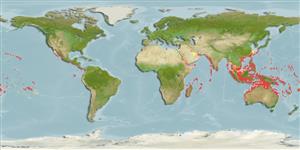Preferred temperature (Ref.
115969): 24.3 - 29, mean 27.8 (based on 1320 cells).
Phylogenetic diversity index (Ref.
82804): PD
50 = 0.5000 [Uniqueness, from 0.5 = low to 2.0 = high].
Bayesian length-weight: a=0.03715 (0.01569 - 0.08798), b=2.87 (2.70 - 3.04), in cm Total Length, based on LWR estimates for this Genus-body shape (Ref.
93245).
Trophic level (Ref.
69278): 3.6 ±0.0 se; based on diet studies.
लौटाव (Ref.
120179): माध्यम, न्यूनतम जनसंख्या दुगनी होने का समय 1.4 - 4.4 वर्ष। (Preliminary K or Fecundity.).
Fishing Vulnerability (Ref.
59153): Moderate vulnerability (40 of 100).
